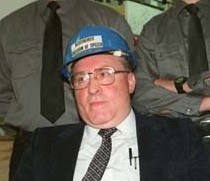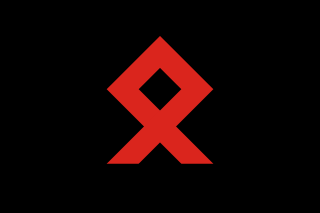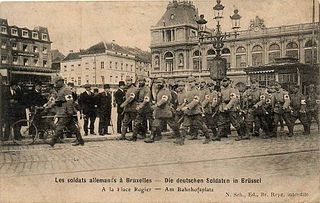Related Research Articles

Ernst Christof Friedrich Zündel was a German neo-Nazi publisher and pamphleteer of Holocaust denial literature. He was jailed several times: in Canada for publishing literature "likely to incite hatred against an identifiable group", and on charges of being a threat to national security; in the United States, for overstaying his visa; and in Germany for charges of "inciting racial hatred". He lived in Canada from 1958 to 2000.
The Arab European League is a Pan-Arabist political organisation active in Belgium and the Netherlands.

The Vlaamsch Nationaal Verbond, widely known by its acronym VNV, was a Flemish nationalist political party active in Belgium between 1933 and 1945. It became the leading force of political collaboration in Flanders during the German occupation of Belgium in World War II. Authoritarian by inclination, the party advocated the creation of a "Greater Netherlands" (Dietsland) combining Flanders and the Netherlands.

Philip Michel Frans "Filip" Dewinter is a Belgian politician, journalist and commentator. He is one of the leading members of Vlaams Belang, a right-wing Flemish nationalist and secessionist political party.

Fort Breendonk is a former military installation at Breendonk, near Mechelen, in Belgium which served as a Nazi prison camp (Auffanglager) during the German occupation of Belgium during World War II.
The Belgian Holocaust denial law, passed on 23 March 1995, bans public Holocaust denial. Specifically, the law makes it illegal to publicly "deny, play down, justify or approve of the genocide committed by the German National Socialist regime during the Second World War". Prosecution is led by the Belgian Centre for Equal Opportunities. The offense is punishable by imprisonment of up to one year and fines of up to 2,500 EUR.
The Adelaide Institute was a Holocaust denial group in Australia and is considered to be antisemitic by the Australian Human Rights Commission and others. The Adelaide Institute was formed in 1995 from the former Truth Mission that was established in 1994 by Fredrick Töben, later a convicted Holocaust denier. Töben directed the Institute until his incarceration in 2009 in South Australia for contempt of court. Peter Hartung assumed the role of director of the Adelaide Institute. On assuming the role from Töben, Hartung defied the Federal Court by publishing the revisionist material that led to Töben's three months jail time. In June 2009, the Adelaide Institute was linked with an American white supremacist, James von Brunn, charged with killing a security guard in Washington's Holocaust Museum.
Germar Rudolf, also known as Germar Scheerer, is a German chemist and a convicted Holocaust denier.

The Order of Flemish Militants – originally the Flemish Militants Organisation – was a Flemish nationalist activist group in Belgium defending far-right interests by propaganda and political action. Established in 1949, they helped found the People's Union in 1954, a Belgian political party. The links between the extremist VMO and the VU lessened as the party moved towards the centre. In later decades the VMO would become linked to neo-Nazism and a series of paramilitary attacks on immigrants and leftists before disappearing by the late 1980s.
Gerald Fredrick Töben, more commonly known as Fredrick Töben, was a German-born Australian citizen who was director and founder of the Adelaide Institute, a Holocaust denial group in Australia. He was the author of works on education, political science, and history.

Horst Mahler is a German former lawyer and political activist. He once was a far-left militant and a founding member of the Red Army Faction who later became a Maoist, before switching to neo-Nazism. Between 2000 and 2003, he was a member of the far-right National Democratic Party of Germany. Since 2003, he has repeatedly been convicted of Volksverhetzung and Holocaust denial, and he served much of a twelve-year prison sentence.

Sylvia Stolz is a German Neo-Nazi, convicted Holocaust denier and former lawyer. Denial of the Holocaust is a criminal offense in Germany.
Simon Guy Sheppard is a British far-right extremist from Hull, England, who runs a number of websites that promote misogynist and antisemitic doctrines. His main website contains many articles about women, the multiracial society, and Jews, stating that they have negative effects upon western society and for white males in particular.
Fredegardus Jacobus Josephus (Jef) van de Wiele was a Belgian Flemish Nazi politician. During the Nazi occupation of Belgium he became notorious as the leader of the most virulently pro-Nazi wing of Flemish politics.
In 2005, the British author and Holocaust denier David Irving was arrested for Holocaust denial in Austria. In early 2006, he was convicted and given a sentence of three years, of which he served 13 months after a reduction of his prison sentence.

August Borms was a Flemish nationalist politician active in Belgium during the first half of the twentieth century. He belonged to the far-right of the Flemish movement. Borms collaborated with Germany during both the First and Second World Wars and was sentenced to death at the end of each conflict. He was not however executed until 1946, having had his sentence quashed the first time.
Vincent Reynouard is a French Holocaust denier and proponent of neo-Nazism. He has been convicted and jailed in France under the Gayssot Act, which bars Holocaust denial.

The Holocaust in Belgium was the systematic dispossession, deportation, and murder of Jews and Roma in German-occupied Belgium during World War II. Out of about 66,000 Jews in the country in May 1940, around 28,000 were murdered during the Holocaust.

The German occupation of Belgium of World War I was a military occupation of Belgium by the forces of the German Empire between 1914 and 1918. Beginning in August 1914 with the invasion of neutral Belgium, the country was almost completely overrun by German troops before the winter of the same year as the Allied forces withdrew westwards. The Belgian government went into exile, while King Albert I and the Belgian Army continued to fight on a section of the Western Front. Under the German military, Belgium was divided into three separate administrative zones. The majority of the country fell within the General Government, a formal occupation administration ruled by a German general, while the others, closer to the front line, came under more repressive direct military rule.
The Moroccan mafia is a term that describes various criminal organisations that are primarily made up of people of Moroccan descent. These organisations are specialized in trafficking large quantities of cocaine and synthetic drugs through Spain, Portugal, the Netherlands and Belgium, from where it is distributed to the rest of the European continent, thus being one of the most dominant participants in the European drug trade.
References
- ↑ JREF Forum, Siegfried Verbeke application
- ↑ Prison ferme pour deux négationnistes, Le Soir, 20 June 2008